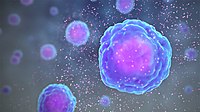
Photo from wikipedia
Interleukin-18 (IL-18) is a potent pro-inflammatory cytokine involved in host defense against infections and regulates the innate and acquired immune response. IL-18 is produced by both hematopoietic and non-hematopoietic cells,… Click to show full abstract
Interleukin-18 (IL-18) is a potent pro-inflammatory cytokine involved in host defense against infections and regulates the innate and acquired immune response. IL-18 is produced by both hematopoietic and non-hematopoietic cells, including monocytes, macrophages, keratinocytes and mesenchymal cell. IL-18 could potentially induce inflammatory and cytotoxic immune cell activities leading to autoimmunity. Its elevated levels have been reported in the blood of patients with some immune-related diseases, including rheumatoid arthritis, systemic lupus erythematosus, type I diabetes mellitus, atopic dermatitis, psoriasis, and inflammatory bowel disease. In the present review, we aimed to summarize the biological properties of IL-18 and its pathological role in different autoimmune diseases. We also reported some monoclonal antibodies and drugs targeting IL-18. Most of these monoclonal antibodies and drugs have only produced partial effectiveness or complete ineffectiveness in vitro, in vivo and human studies. The ineffectiveness of these drugs targeting IL-18 may be largely due to the loophole caused by the involvement of other cytokines and proteins in the signaling pathway of many inflammatory diseases besides the involvement of IL-18. Combination drug therapies, that focus on IL-18 inhibition, in addition to other cytokines, are highly recommended to be considered as an important area of research that needs to be explored.
Journal Title: Frontiers in Immunology
Year Published: 2022
Link to full text (if available)
Share on Social Media: Sign Up to like & get
recommendations!